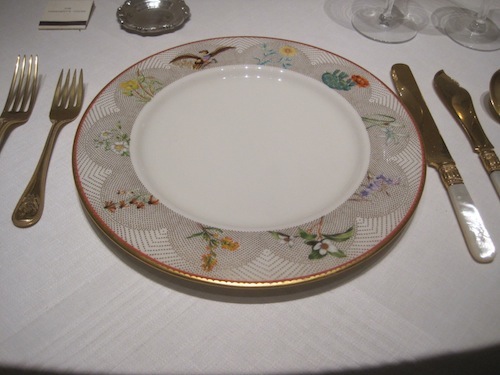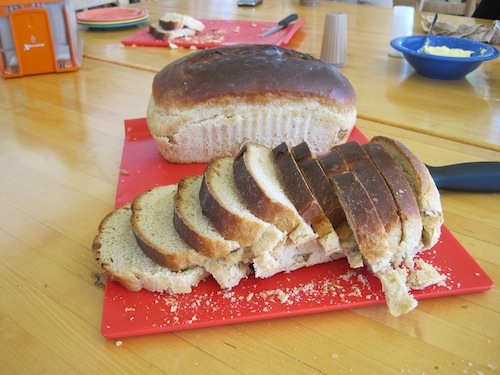 Photo: Laura Lynn Brown
Photo: Laura Lynn Brown
Presidents are popular, especially Abe Lincoln, Bill Clinton, George Washington, and Ronald Reagan. Martin Luther King Jr. is often invited. Nelson Mandela shows up on a number of guest lists, as does Elvis, even once at the same table. One host would seat Babe Ruth and Paula Deen together.
“To my fantasy dinner party, I would invite . . . ” is a common question in the Q&A accompanying the long profile feature published each Sunday in the newspaper where I make my living. It’s a question that contains other unasked questions within it, unexamined assumptions. One of my fantasy features would be to collect a list of those lists from over the years, and to ask some of those profilees, “Why is this your fantasy? What makes a dream dinner party? Wouldn’t it make you nervous to have So-and-so at your table? Would you have them over or eat out? Is it mainly the conversation you would relish? What one question would you ask each guest? Would you expect Elvis to sing? Would you serve foods that George Washington would recognize, or trust that he could navigate the Delaware of modern cuisine?”
It’s not just a question for movers and shakers who get their 70 inches of ink and 15 minutes of fame, though. Some of us imagine famous people past and present that we’d like to meet, and perhaps to do some interviewing of our own. (A delightful college librarian who’s no longer on this earth said she had some questions for the apostle Paul, but she’d like Jesus at the table too, to keep Paul honest.) More of us, I imagine, dream about tables where we’d like to get people from different segments of our lives together, people whom we most like, people who most like us, and to see what happens once there are zero degrees of separation between them.
I have three dinner party fantasies. To the first I would invite all the writing Lauras I know, and all the writing Lauras they know, and all of our mothers. It would be a potluck, with each of us recreating a favorite dish of mom’s. For the conversational main dish, our mothers would tell the stories of our naming. It would take place in a library, after hours.
The second would be family-only, the four generations of us who remain and the host of Browns and Gosneys and Gallahers and Funkhousers who have gone on. I want to be seated close to my mother, and her mother, and my aunt Susie, whom we shared so many tables with before they all left us within a year of each other, more than twenty years ago. And I want to see again, as an adult, those who departed when I was young: Mom’s dad, whom I remember dimly as a white-haired, cheerful bedfast presence in Nanaw’s room when I was a toddler; Margaret and Josephine, the spinster sisters who lived on a farm with a big sheepdog named Chief and a barn seamed with trumpet vine every spring; my great-aunt’s mother, a plain-spoken presence in a wheelchair on our summertime week-long visits; Dad’s dad, Pop-Pop Brown, who sounded a little like Hillbilly Bear when he talked, who walked with a limp from one leg shortened by childhood polio, whose occasional grin and pale blue-eyed bemusement spoke his affection for me.
And there’s a giddy anticipation for meeting another group I’d invite to this table, those whom I know of only from the stories I’ve heard and the black and white photos handed down. My father’s mother, who died of cancer when he was a teenager. My mother’s eccentric bachelor uncle Carl, whom she had so many stories about and who gave her the gift of truly seeing her and talking to her as a full-fledged person when she was a child. My grandmother’s father, a minister who loved newspapers and wrote thoughtful letters to the editor. All the farm women who were pictured throughout the years standing with a horse or a cow. And the Gallaher clan all the way back to Patrick, my great-great-great-great-great-grandfather, who left Ireland for western Pennsylvania in 1780. It would take place on the land those elderly sisters left my mother, near the house she planned but never got to build, outside at long tables with red and white checkered cloths set with bounty from the garden my father plants on that hill every spring.
The third dinner party, though, is the one I think about most lately, and the reason I am writing about them in the first place, because of this collection of people I carry in my mind. Some of them I’ve seen only once. Most of their names are unknown to me. If I wrote fiction, they might make their ways into stories that imagine the truth of their lives and animate them in a made-up world that still preserves whatever made them memorable. But I don’t, so they merely get carried in odd corners of the mind, like the random caches of yellow sticky notes that collect in my desk and purse and pockets, like the sea turtles and alligator gar and leafy sea dragons that occasionally float again through the vast aquarium of memory.
The husband of the husband-and-wife act who tried out on Lawrence Welk decades ago, her singing, him playing the snare drum with solemn focus, and who was not seen again after she became a regular.
The classmate in a poetry course I took the summer after my mother died of a blown heart, who invited me to go to TCBY after class one night, who had also lost her mother not long before, and whom I turned down, claiming too much homework or some other excuse of the shy, which I regretted before nightfall and still regret decades later.
The can lady, who pushed a grocery cart up and down the main road of Benton, Arkansas, stopping in to collect aluminum cans to recycle, who sometimes carried a small dog in her buggy and sometimes carried a golf club.
The young mother whose car I accidentally rear-ended in bumper-to-bumper morning traffic years ago.
The elderly woman who ran a red light and hit my car the same year, and whose car keys were taken away after that.
Kenneth, the gentle-giant security guard with the high-pitched voice who walked me to my car after work, was passionate about sweet tea, always had a story to tell (even when I had my door open, one foot in the car, waiting for him to reach the end of his paragraph), felled in his 30s by a heart attack.
The mustached young man I used to pass when I walked to work in the morning, possibly walking home after a graveyard shift in food prep at one of the downtown hotels, wearing a kitchen smock, looking spent and defeated, as if someone had treated him meanly, who seemed so surprised to be spoken to the December I offered him one of the candy canes in my pocket, who took it and said thank you.
The cashier at the Stop N Go on the corner, whose eyes are sometimes red-rimmed.
The cashier named Meghan at the Dollar Store who never made eye contact.
The little girl shopping alone at the same store last December, purposefully working her way from aisle to aisle, carefully considering the choices, marking off a name on a neatly written Christmas list after each item she laid in her cart.
The evening manager at the Waffle House, who tends to remember what I ordered last time, even though last time may have been months ago, and who stepped in at the grill as a busy Christmas Eve turned to Christmas Day, remaking the eggs for the angry woman in a wheelchair, whisking them fluffy and teaching the cook, “This is how she likes them.”
The angry woman in the wheelchair, who might have begun her Christmas Day at Waffle House because that’s the closest thing she has to family.
And the face who haunts me most often, the boy in my Philosophy of Religion class a few summers ago, who considered himself an atheist, whose father was an Assembly of God preacher, who wore band T-shirts and overalls, who had a thick braid of honey-colored hair and the tapered beard and beautiful sad face of an Orthodox icon.
The seating arrangement will be tricky, because some of these people are shy and will not be comfortable talking to strangers. They might feel uncertain about proper table manners or what to wear. They probably don’t get asked out much. But none of that matters. At this fantasy dinner party, every one of them will arrive with any fear in their hearts replaced with hope. We’ll start with good bread, still warm. For each one, there will be a moment like a combination lock falling into place — a perceptive question someone asks, a conversation thread that reminds them of a story they want to tell — and they will open, and speak confidently and unselfconsciously. By the time dessert is served (good pie, still warm), every one of us will have given and received the gift of being fully seen and known.
 Photo: Laura Lynn Brown
Photo: Laura Lynn Brown
Laura Lynn Brown learned the folkways of dinnertime in eastern Ohio; first practiced her hostess skills while a grad student in Pittsburgh, PA; and now sets her table in Little Rock, AR.















